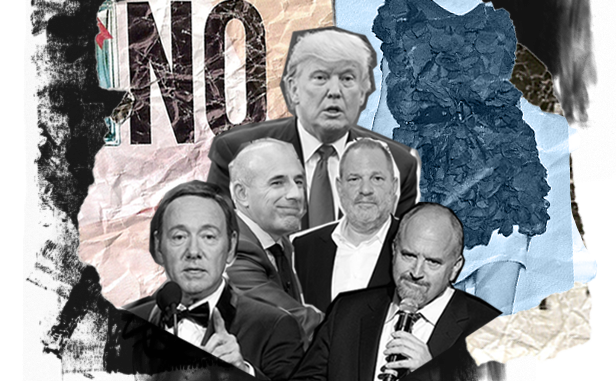

COURTNEY REDMON / THE TEMPLE NEWS
When word of Harvey Weinstein’s sexual misconduct surfaced, I wasn’t all that surprised — a lot of men do a lot of problematic things. In a nation where the current president has openly bragged about grabbing women by their genitals, I’d resigned myself to that truth.
I didn’t think much of the Weinstein scandal. It seemed like these kinds of stories peppered the news cycle every once in a while, only to quickly fizzle out. But then the floodgate of allegations opened and names like Kevin Spacey, Louis C.K., Charlie Rose and Matt Lauer came rushing out.
I felt violated and oddly betrayed. These were talented men I’d laughed at, rooted for and identified with — I had watched these men in movies and on television, and had grown to respect them. There was a time in the not-so-distant past when I even identified as some sort of female Louis C.K., but not anymore.
In hindsight, I probably shouldn’t have been so surprised that a man like Louis C.K., who had made masturbation jokes an integral part of his comedy routines, was being decried for unsolicitedly exposing himself and masturbating in front of women.
Our society has operated within a crudely imbalanced system of expectation, accountability and consequence for a long time. When men — especially straight, white men — make mistakes, they are slapped on the wrist and given a warning. This fosters a world where men feel free to do as they please, often at the expense of others. They know they are untouchable and they wield that to their advantage.
So the reactions to all these accusations of sexual misconduct have come as a pleasant surprise. For the first time, people are listening and taking action. Titans of industry and masters of talent are being exposed, one by one, and crumbling at the hands of their own wrongdoing. For once, men are being held accountable for their actions.
As more time passes, the more confused I’ve begun to feel about these high-profile “revelations” of abuse, assault and worse. I’ve had no idea how to go about unpacking these complex issues, or how I should feel about the pieces of art and media these men have created.
I’m not sure where to draw the line and divorce the man from the work. I don’t think all things done by problematic people cease to hold merit in light of the despicable things they’ve done in their private lives.
Countless men throughout history — from Thomas Jefferson to Bill Clinton— have been celebrated for their achievements while their problematic qualities go relatively unchecked. This has begun to change in recent years, but often at the expense of acknowledging the positive impacts they may have had. It’s a fine balancing act, but I believe these men deserve more thoughtful consideration.
Does that make me an apologist, or a sympathizer? Does that make me less of a feminist? I don’t know. I hope not. Does it make a difference if I admit that I, too, am a victim of sexual assault? I guess that depends on the reader.
We shouldn’t treat individuals accused of sexual assault or harassment as isolated incidents; they’re not outliers. Viewing them as either entirely good or bad, and then ostracizing the bad doesn’t lead to real change.
These problems are certainly bigger than just individuals here and there. They’re systemic and ingrained within all aspects of our society — they always have been. Working to dismantle something as massive and deeply-rooted as the patriarchy may seem like an impossible task, but it’s something I feel morally obliged to attempt.



Be the first to comment